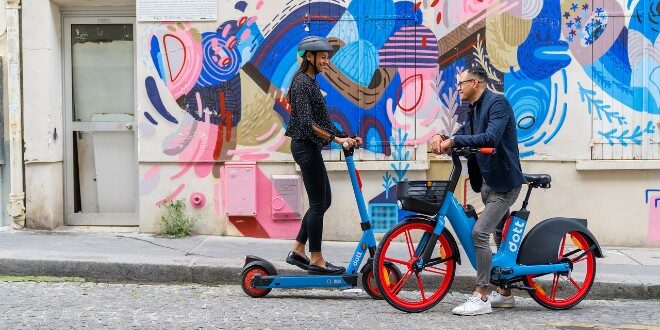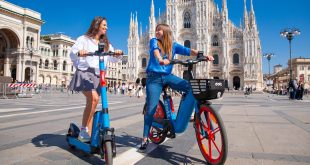Laura Hensel, Sustainability Manager, Dott
Batteries are a big challenge in our industry. They are made of finite resources, repairing is often impossible due to the protective design, and they are very difficult to recycle.
At Dott, as we work towards our mission to free our cities with clean rides for everyone, we are looking at solutions for the long term to help us move beyond carbon neutrality and actively lower the volume of greenhouse gasses that our services produce. This starts with the production and management of our vehicles, and we are starting 2022 by exploring a more sustainable battery choice for our e-scooters and e-bikes.
To combat these challenges, we have teamed up with battery experts Gouach to explore their repairable battery solutions. The Gouach battery is modular, so each part can be dismantled and fixed if issues arise, allowing our maintenance team to more easily spot the problem, fix it, and get the battery back into our operation. As a result, we can extend the lifetime of our batteries and significantly reduce the number of batteries we have to find second-life applications for as they keep being looped back into our own operations.
As this new battery can be fully repaired, the design significantly reduces the carbon footprint of the battery. This cut matters to us at Dott, and can help us to achieve lower overall emissions for our service. In 2021, we reduced our CO2 emissions by 40%. By working on new and innovative solutions, such as alternative and more environmentally friendly batteries, we can further lower our carbon footprint, helping us achieve our long term goal of less than 20g of CO2 per km. If the current tests go well, we will be progressing with necessary certifications before sending more batteries out to our fleets for testing.
We have always taken care to dispose of our used batteries in a responsible way, and we work with a number of sustainable partners to find second life applications for the batteries that have reached the end of their lifetime with us. For example batteries that were no longer fit to use in our vehicles are taken apart and made into power storage units in solar power farms. But this new partnership could offer a smarter, more sustainably responsible way to care for our batteries in the future.
Read more: Beryl shared bike schemes now displayed on Google and Apple Maps
A collaboration with Gouch is a more circular approach, reusing different components and the cells of our batteries over and over again. If successful, we can improve one of the biggest environmental pain points in micro-mobility, and at scale.
 micromobilitybiz Delivering news updates to the micromobility industry, focusing on e-bikes, e-scooters and green transport
micromobilitybiz Delivering news updates to the micromobility industry, focusing on e-bikes, e-scooters and green transport




